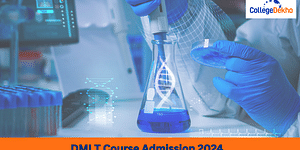MD Pathology
MD in Pathology Course Overview
Doctor of Medicine or MD in Pathology is a postgraduate degree. Students can apply for this degree after completing their MBBS course. The duration of this course is 3 years, and it includes a 1-year in-house internship for the students. An MD in Pathology course includes an elaborative study on topics like neurology, immunology, neuroscience, etc. Students are eligible to become pathologists or even can conduct clinical or laboratory research after completing their MD in Pathology course.
Admission to this course is given based on the marks secured by the students in entrance exams which are conducted on a national level. The major entrance exam is NEET-PG which entitles students to take admission to any college all over India based on their rankings.
This is a full-time offline course. Distance or online learning is not offered in the MD Pathology course. Some eminent colleges that offer MD in Pathology courses are; Calcutta Medical College, AIIMS-Delhi, Armed Forces Medical College, Grant Medical College, etc. The average course fee range for MD in Pathology course is 10,00,000 to 35,00,000 INR in India. Successful completion of this course will entitle individuals to explore careers as Consultant Pathologists, HOD - Laboratory Medicine, advisors, etc.
Table of Contents
- MD in Pathology Course Overview
- Important Highlights of MD Pathology Courses
- Why Should You Choose MD In Pathology Course
- Entrance Exams For MD In Pathology Course:
- MD Pathology Course Eligibility Criteria
- Admission Process of MD Pathology
- Colleges In India Offering MD In Pathology
- Top Medical Colleges Abroad For MD In Pathology
- Top Colleges Offering MD In Pathology (State and City Wise):
- MD In Pathology Course Fee
- Syllabus For MD In Pathology
- Subjects Of Study Under MD In Pathology Course
- Best Books For Students of MD in Pathology
- Career And Salary After MD In Pathology Course In India
- Skills Required For MD In Pathology Course
- Top Recruiters Of Students With MD In Pathology Course Degrees
- FAQs about MD Pathology
Important Highlights of MD Pathology Courses
Here are quick highlights regarding the MD Pathology degree course:
| COURSE NAME | MD in Pathology |
|---|---|
| DURATION | 3 YEARS |
| ELIGIBILITY | 5 years MBBS degree with 55% aggregate marks and qualified NEET-PG exam. |
| ADMISSION PROCESS | Entrance examination conducted on a national basis |
| EXAMINATION TYPE | Semester-based, each after 6 months |
| AVERAGE COURSE FEE | 5,00,000 to 15,00,000 INR |
| AVERAGE COURSE FEE (ABROAD) | 10,00,000 to 40,00,000 INR |
| AVERAGE SALARY OFFERED IN INDIA | 50,000 to 1,00,000 INR (depending upon the experience and skill set of the person) |
| AVERAGE SALARY OFFERED ABROAD | 70,000 to 2,50,000 INR (depending upon the area, skill set, education level, and experience of the individual) |

Why Should You Choose MD In Pathology Course
In India, medical study is one of the most sought-after courses among students. Pathology deals with many main areas of study. There are many job roles that a person can choose from after completing their MD in Pathology degree. People can also avail many scholarships, fellowships, and research grants that are associated with MD in Pathology degree. Several high-paying roles like Neuropathology, Hematology, Clinical Pathology, Genetics, etc. are available for people after completing their degree in MD Pathology.
Besides, the job role of a pathologist is very important for people who want to make an important contribution to the medical field. It is based on their interpretation and analysis of cells, tissues, and blood, other practitioners of medicine diagnose and suggest medicines for any disease.
Entrance Exams For MD In Pathology Course:
Though some institutions conduct separate entrance exams, NEET-PG scores are mandatory during the time of admission. The Council mentions no specific age limit. Students must also complete 1-year internship before applying for MD in Pathology course. Some other entrance exams are
-
AIIMS PG: Passing this national-level examination makes a candidate eligible for taking admission in any post-graduation courses to any AIIMS institutes in any part of India. The test is conducted online mode from designated exam centers. The syllabus of the test covers the entire syllabus of the MBBS degree. AIIMS PG consists of 200 questions that are multiple-choice based.
-
JIPMER PG: Jawaharlal Nehru Post Graduate Medical Education and Research Exam is a computer-based examination procedure held in Puducherry. The score of this examination is recorded for securing admission in MD courses. There are a total of 250 questions and students get a time limit of 3 hours. The syllabus for this entrance exam includes subjects like pathology, microbiology, physics, applied physiology, social and preventive medicines, etc.
-
COMDECK PGET: Consortium of Medical, Engineering, and Dental Colleges is the state-level examination of Karnataka conducted for admission to MD in Pathology courses. This exam is held in the month of June to July. The duration of this exam is 3 hours. The full mark for this test is 180. All the questions are multiple-choice based.
-
DNB CTET: Diplomate of National Board is another national-level entrance test conducted in the month of July.
-
UPSEE: This is an offline exam where students have to visit designated exam halls which are decided by the examination authority. The test consists of a total of 8 papers. The papers are divided into mathematics, physics, chemistry, biology, general awareness, general aptitude, architecture and designs, a Diploma in Pharmacy, etc. All the sections contain 100 objective-type questions.
MD Pathology Course Eligibility Criteria
Here is the eligibility criteria for MD Pathology Course:
- Students who wish to pursue their MD in Pathology courses, need to complete their 5 years MBBS degree in the relevant subject from a college recognized by the All Indian Medical Council.
- They need to pass with a minimum aggregate of 55% marks.
- The applicants must complete a 1-year internship. Also, aspirants need to pass the entrance exam of NEET-PG.
- Students qualifying for this exam become eligible to take admission to any medical college in India.
- There is no age limit specified by the AIMC.
- Aspirants who wish to pursue this course abroad need to sit for Foreign Medical Graduate Examination (FMGE), registered under the All India Medical Council.
- It should be kept in mind that along with the qualifying marks in the above-mentioned exams, admission to foreign universities requires applicants to possess a few other mandatory certificates like ILETS, GRE, GMAT, and TOEFL.
- These are the language proficiency examinations for studying in countries where English is the native language.
- The minimum score requirement for admission depends upon the respective universities.
Admission Process of MD Pathology
Like all other MD degrees, aspirants who wish to enroll in pathology courses, need to clear an entrance exam called National Eligibility cum Entrance Test Post Graduate (NEET-PG) which is conducted on a national level. The National Board of Examinations (NBE) conducts the National Eligibility cum Entrance Test for Postgraduate (NEET-PG) which is approved by the All India Medical Council. Applicants are ranked according to the secured marks. The test is conducted on a computer-based platform and consists of 300 multiple-choice questions. After the examination, a counseling session is held with the qualified students where colleges are allocated based on personal preferences and ranking.
How To Apply for MD Pathology?
Candidates have the provision to apply for the MD Pathology degree both in the offline and online mode. In order to apply for the course, students need to visit the official website of the colleges/universities and download the application form. After that, applicants need to fill in their important details and upload documents. After that, applicants must pay the application fee that the college/university decides. In the case of offline application, students need to visit the college campus and submit the application form along with the fee.
Selection Process of MD Pathology
In the selection process for an MD Pathology degree, the marks of the candidates in the entrance exam is calculated. Alongside that, the marks of the students in the higher secondary examination is also calculated along with the marks at the graduation level.
Colleges In India Offering MD In Pathology
Some of the top colleges in India which offer MD degrees in Pathology are:
COLLEGE NAME |
COURSE FEE |
|---|---|
|
4,80,000 INR |
|
|
St. Johns Medical College, Bangalore |
4,86,000 INR |
|
16,80,000 INR |
|
|
Calcutta Medical College, Kolkata |
21,00,000 INR |
|
Institute of Post Graduate Medical Education Research, Kolkata |
1,20,000 INR |
|
Grant Medical College, Mumbai |
2,83,000 INR |
|
Goa Medical College, Panaji |
5,62,000 INR |
|
Maulana Azad Medical College, Delhi |
1,00,000 INR |
|
Institute of Medical Sciences Banaras University, Varanasi |
61,000 INR |
|
3,86,000 INR |
Top Medical Colleges Abroad For MD In Pathology
MD in Pathology is a highly demanded course in countries like USA, UK, Australia, etc. Some of the top colleges abroad for completing an MD Degree in Pathology are:
COLLEGE NAME |
COURSE FEE |
TOEFL SCORE (OUT OF 120) |
|---|---|---|
|
University of Toronto |
25,00,000 INR |
100 |
|
Memorial University of Newfoundland |
17,45,000 INR |
79 |
|
University of Illinois |
23,61,000 INR |
80 |
|
McGill University |
68,00,000 INR |
86 |
|
Northeastern University |
39,00,000 INR |
100 |
|
Teesside University |
20,57,000 INR |
93 |
|
The University of British Columbia |
37,00,000 INR |
100 |
|
Harvard University |
27,00,000 INR |
110 |
|
Melbourne University |
31,00,000 INR |
97 |
|
Arizona State University |
40,00,000 INR |
89 |
Top Colleges Offering MD In Pathology (State and City Wise):
DELHI |
|
|---|---|
|
College/University |
City |
|
All India Institute of Medical Sciences |
New Delhi |
|
University College of Medical Sciences |
New Delhi |
|
Kota |
|
|
New Delhi |
|
|
Jamia Hamdard University |
New Delhi |
|
SGT University |
Gurgaon |
|
New Delhi |
|
|
New Delhi |
|
|
Hamdard Institute of Medical Sciences and Research |
New Delhi |
West Bengal |
|
|---|---|
|
College/University |
City |
|
Calcutta Medical College |
Kolkata |
|
Bankura Sammilani Medical College |
Kenduadihi |
|
Burdwan Medical College and Hospital |
Burdwan |
|
Siliguri |
|
|
Kolkata |
|
|
Kolkata |
|
|
Kolkata |
|
|
West Bengal University of Health Sciences |
Kolkata |
|
Kolkata |
|
Maharastra |
|
|---|---|
|
College/University |
City |
|
Sevagram |
|
|
Dr. DY Patel Vidyapeeth |
Pune |
|
Pune |
|
|
Grant Medical College |
Mumbai |
|
Government Medical College and Hospital |
Nagpur |
|
Sir JJ Medical College and Hospital |
Mumbai |
|
Dhule |
|
|
Lokmanya Tilak Municipal Medical College |
Mumbai |
|
Tata Memorial Centre |
Mumbai |
Karnataka |
|
|---|---|
|
St.Johns Medical College |
Bangalore |
|
KS Hedge Medical Academy |
Mangalore |
|
JSS Medical College and Hospital |
Mysore |
|
Manipal |
|
|
Bangalore |
|
MD In Pathology Course Fee
The fee for MD in Pathology course is different for every college. Private colleges' cost is more than government or public colleges. The average course fee range for private colleges varies between 5,75,000 to 30,00,000 INR. The average course fee range for government or public medical institutions varies between 50,000 to 5,00,000 INR. This college fee depends upon several factors like; the location of the college, the available resources of the laboratory, the infrastructure of the college, etc.
Syllabus For MD In Pathology
In most colleges, especially in India, the 3 years of MD in Pathology are divided into 6 semesters. In each semester, the students are given extensive and in-depth knowledge about several important topics which makes them well-knowledgable about the various areas and topics of study about Pathology. All the semesters include a thorough demonstration of the use of complex types of medical equipment and require hours of training at the laboratory as specified by the Regulatory body. The semester-wise division is given in the chart below for your convenience:
Semester 1 |
Semester 2 |
Semester 3 |
Semester 4 |
Semester 5 |
Semester 6 |
|---|---|---|---|---|---|
|
Basic sciences |
General pathology |
Histopathology |
Immunopathology |
Clinical biochemistry |
Medical autopsy: procedure and interpretations |
|
Biomedical ethics |
Hematology |
Microbiology |
Cytopathology |
Immunopathology |
Histopathology |
|
Biostatistics- P & S.M |
Systematic pathology |
Clinical Pathology |
Systematic Pathology |
Organization of the laboratory including quality control |
Anatomical Pathology |
|
Orientation to Service Department by a clinical and paraclinical doctor |
Blood banking and transfusion medicine |
Biowaste disposal |
Hematology |
||
|
General Pathology Cytopathology |
Clinical Pathology |
Subjects Of Study Under MD In Pathology Course
The syllabus of the MD in Pathology course is divided into 2 parts: theory and practical. Furthermore, The areas of study included are:
-
Surgical Pathology: It includes the study of the tissues which are removed during any surgical procedures, in order to study probable diseases and diagnose them accordingly. The students also learn about microscopic and macroscopic levels of examinations of the tissues, which are submitted by surgeons and non-surgeons, for identifying diseases.
-
Forensic Pathology: This branch of pathology studies finds probable causes and times of death of any living organism. The extensive use of forensic pathology can be seen in any criminal case. Forensic pathology also includes post-mortem tests to determine the cause and probable time of death.
-
Cytopathology: This branch of pathology includes extensive studies about the causes, effects, and diagnosis of diseases, at the cellular level. It involves studying how to separately collect cell samples from any tissue in order to understand the nature of the disease.
-
Immuno Pathology: Students choosing this area, study the pathology of the immunity system of organisms, their immunity, and responses to diseases of the immunity system. It studies how the immune system reacts to several pathogens. Various diseases caused by immunity-related issues are researched and studied under this subject.
-
Systematic Pathology: Under these subjects, any disorder or disease related to any particular organ, is discussed. Some of the major components of Systematic Pathology include; etiology, epidemiology, macroscopic and microscopic appearances, sequelae, etc. It also investigates the pathogenesis and etiology is diseases.
-
Anatomical Pathology: This stream of pathology studies how any particular disease affects the human body and also determines the cause of the disease. It includes macroscopic, microscopic, molecular, and immunologic levels of examination of the organs and tissues of organisms for finding any diseases.
-
Histopathology: Tissues that are obtained from various organisms are tested in a laboratory under a microscope. This area of study falls under histopathology. Biopsy and Pathology reports are made using Histopathology results. Various interpretation techniques like molecular technique, immunohistochemistry technique, chromosomal technique, etc. are taught in this section.
-
Hematology: This stream of pathology studies all the diseases and their preventive measures, related to blood. Extensive studies about all the blood disorders, blood-forming organs, etc. are studied under Hematology. Studies that are conducted on bone marrow also fall under Hematology. Cancer research is also part of this discipline.
-
Clinical Pathology: Students opting for this stream study the diagnosis of several body fluids, tissues, and blood cells in a laboratory.
-
Molecular Pathology: Under this subject, students learn to study various diseases, their causes, and treatment at a molecular level. This is now the most popular and emerging stream of pathology courses.
-
Neuro Pathology: The students are taught about various neurological anatomies, their diseases, and how to clinically detect and diagnose them in a laboratory, under this subject. This also includes pathological studies about the anatomy of the eye.
-
Blood Banking and Transfusion Medicine: This is one of the most vital as well as vast areas of study under MD in Pathology. The coursework of this subject includes a detailed study about the properties of blood, various diseases attacking blood cells, how to properly detect the causes of several bloodborne diseases, how to maintain blood banks and rudimentary of blood transfusion, etc.
-
Clinical Biochemistry: Pathologists have to work with a lot of chemical compositions throughout their careers. Without chemicals, it is impossible to examine tissues and cells. For that, they need to have a good grip on the concept of biochemistry which deals with the properties of chemicals. Under this subject, this vital area is covered.
Best Books For Students of MD in Pathology
There are many books available in the market that a student of MD in Pathology can refer to during their coursework. Based on popular reviews, some of the most recommended books for these students are listed below
-
Robbins & Cotran's Pathologic Basis Of Disease
-
Robbins Basic Pathology
-
Robbins And Cotran Review Of Pathology
-
Rapid Review Pathology
-
BRS Pathology
-
Review of Pathology and Genetics by Sparsh Gupta
-
Textbook of Pathology with MCQs by Harsh Mohan
-
Comprehensive Image-Based Review of Pathology by Sushant Soni
-
Review in Pathology with Colour Plates by Nitin Chawla
-
Rosai and Ackermann Surgical Pathology
-
Sternberg Diagnostic Surgical Pathology
-
Weedon’s Skin Pathology
Career And Salary After MD In Pathology Course In India
There are many designations that a candidate can pursue after completing MD in Pathology course. Some of them are:
JOB ROLE |
JOB DESCRIPTION |
AVERAGE SALARY(INR) |
|---|---|---|
|
Medical Examiner |
Examines the causes of death by collecting blood, organs, fluids, etc., and helps in performing the autopsy. |
4.9 to 6.3 lakhs |
|
Clinical Managers |
Manages the overall operations in clinics |
2.2 to 9.8 lakhs |
|
Forensic technicians |
Specialists work alongside jurisdiction to collect physical pieces of evidence from any crime scenes and interpret and analyze them in a laboratory |
3.0 to 5.5 lakhs |
|
Clinical Pathologists |
They study various bodily fluids and tissues of humans and other organisms in order to identify and treat several diseases |
1.5 to 2.0 lakhs |
|
Medical Transcriptionists |
Their task includes converting oral dictations of medical practitioners and converting them into a physical form which includes notes, medical test results, referrals, etc. |
1.75 to 2.2 lakhs |
|
Veterinary Clinical Pathologists |
Individuals specializing in this field determine the causes, effects, and cures of several diseases by studying the body fluids and tissues of animals. They use observation and laboratory settings for their interpretation and analysis. |
3.5 to 6.0 lakhs |
|
Medical Pathologists |
Perform autopsies and interpret the cause, nature, and effects of diseases on any organs of the body by taking specimens from patients and examining them in a laboratory. |
7.0 to 10.00 lakhs |
|
Professors |
They develop curricula related to pathology, teach students, demonstrate various laboratory techniques, and conduct examinations for the optimal development of the students. |
6.0 to 12 lakhs |
|
Lab Executives |
It is their duty to look after the overall functions and facilities available in a laboratory. They are also responsible to conduct research training and maintain the quality and availability of various laboratory equipment |
2.7 to 5.0 lakhs |
Skills Required For MD In Pathology Course
-
Students who aspire to study and complete their MD in Pathology course should possess the optimum skill set and enough competency to help and assist other medical practitioners whenever required.
-
They should have the knowledge to contribute to the development of several techniques and new world research procedures which will take medical science advances to the next level.
-
Also, they can be required to conduct training, evaluate and guide juniors whenever required. For that, they should have the required capabilities and experience.
-
They are also required to possess a skill set that will enable them to oversee, organize and plan the pathological services and facilities that should be available at any medical establishment.
-
He/she should utilize his/her skill and knowledge towards constructing resourceful and updated study material and resources for their own advancement and also look after the development of others in the same field.
-
Keeping an eye for details is another desirable skill set required to excel in this field of study.
-
Candidates studying an MD in Pathology course are expected to possess excellent analytical skills.
-
They should have the capability to correctly interpret anything.
-
Individuals who possess detailed and in-depth knowledge about various areas of study and also a person with very clear concepts are desirable for this discipline.
Top Recruiters Of Students With MD In Pathology Course Degrees
Many medical and nonmedical establishments hire candidates possessing an MD degree in Pathology course. Some of their names are discussed below:
-
Dr. Roy and Trivedi
-
Serum Group
-
Lal Path Labs
-
Manisha Pathology
-
Lab Point
-
Pioneer Healthcare
-
Accu Health Diagnostic
-
Thyrocare
-
Path Kind Lab
-
SRL Diagnostic
-
Oncquest Laboratories Pvt. Ltd.
-
Medall Healthcare Pvt. Ltd.
-
National Institute of Health
-
Central Bureau of Investigation
FAQs about MD Pathology
Can pathologists have their own practice?
Yes. Pathologists can have their own practice. They can legally open their own chamber for tests. They can also work in many private and government hospitals.
When to do an MD in Pathology?
Those who have completed their 5 years MBBS degree, 1-year in-house internship, and cleared the NEET-PG exam can pursue an MD degree in pathology course.
How long is the MD Pathology course?
The duration of an MD in Pathology course is 3 years. This is a doctorate-level course. The coursework also includes 1-year in-house training.
What can I do after MD in Pathology?
After completing MD in Pathology, one can choose to complete any specialization or certification courses in streams like Hematology, Histopathology, Cytopathology, etc.
How much do MD Pathologists earn in India?
The average annual income of a person with an MD Pathology degree is 17,00,000 INR. The annual income depends on various factors like the total work experience of the professional, the job location, achievements of the individual in the field, the knowledge of the professional, etc.
Is MD Pathology a good course??
Yes, it is a very good and in-demand course in India as well as in foreign countries. There are many career opportunities that are increasing day by day and all the destinations are highly paid for. Besides, there are many fellowship and research opportunities that are available along with this course.
What does an MD Pathologist do?
There are many roles played by an MD Pathologist. They mainly take laboratory samples of tissues and blood and run tests for detecting several diseases. They help other medical professionals in treating the patients and also in surgical procedures.
What can I do after MD Pathology?
There are several career options as well as specializations available for a person after completing MD in Pathology. Many governments and private sectors hire these candidates for several high-paying roles.
What is the highest-paying Pathology degree?
Cytopathology is the highest among all the pathology streams. The average annual income of a Cytopathology in India ranges from 1,20,000 to 3,00,000 INR.
Can pathologists prescribe medicines?
Usually, a pathologist cannot prescribe medicines. They can run tests for detecting diseases.
Related Questions
Popular Courses
- Courses
- MD Pathology














